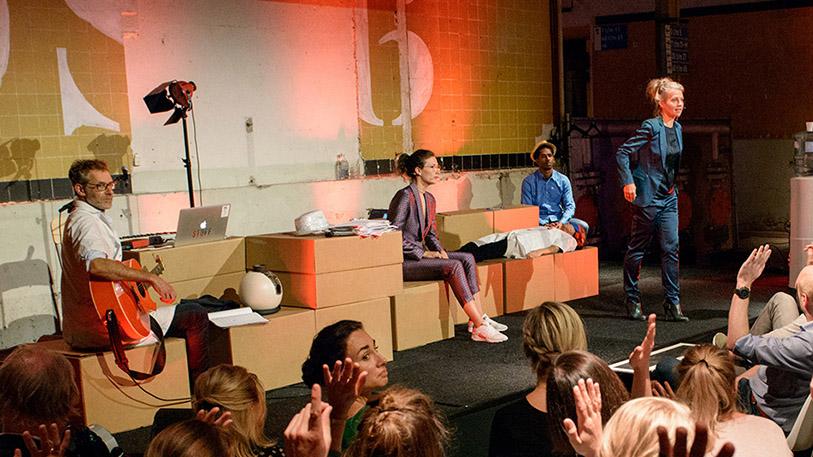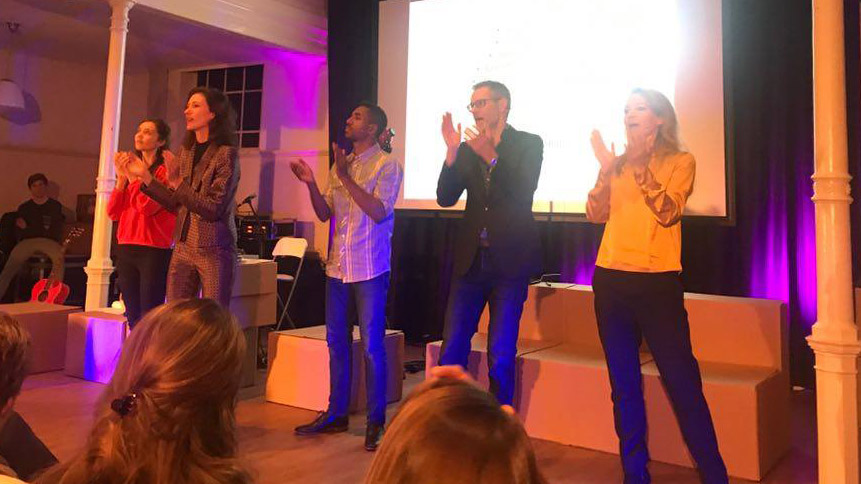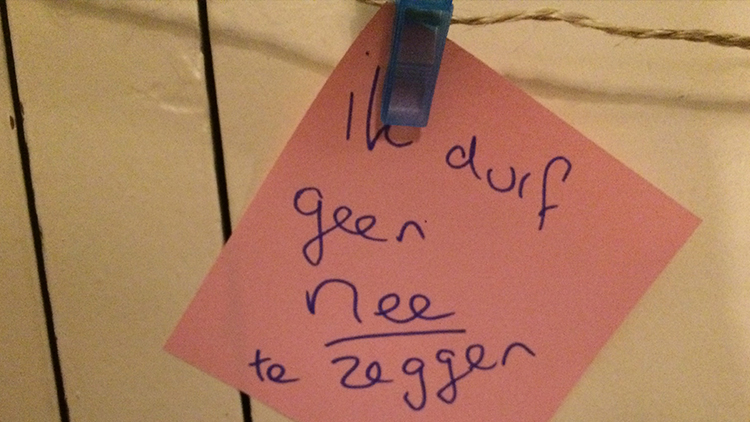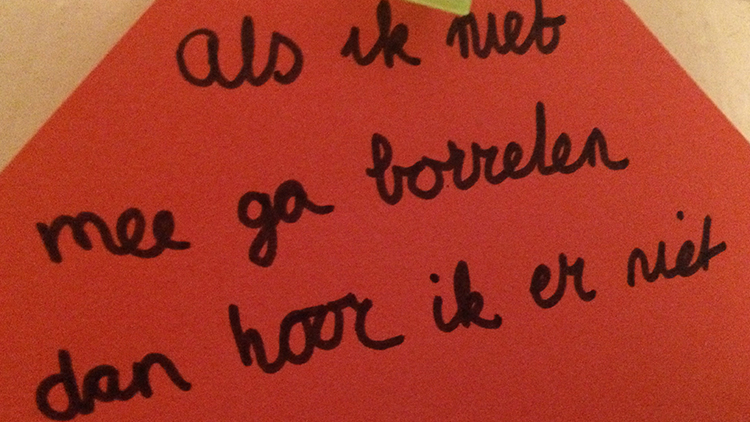Stress among students: “I’m afraid to say no”

The theater debate about stress on this Thursday night in November was prompted by the high percentage of students that deal with stress, the University Council says. The council is collaborating with Podium T, which is presenting the interactive theater project Time Out!, with the aim of removing the taboo surrounding the concept of students experiencing stress.
Judging by the attendance numbers, the theater debate is a success. There are no seats left unoccupied. The theater hall is still closed, but the coffee corner is filled with people talking. With a cup of tea in one hand, I carefully try to make my way through the crowd, and end up at a wishing well filled with lolly pops and brightly colored post-its. Students can write down their own wishes and share them anonymously. The wishing well is filled with vulnerable confessions such as “overcoming my insecurities” and “dare to celebrate small victories”. Elsewhere, paper streamers hang carrying more texts: “I do most things out of a sense of guilt”, “I’m afraid to say no”, and “always feeling the pressure to do even more and even better”. The texts illustrate the need to talk about stress among students.

Sonja de Wit and Juliette Smits confirm that students often experience a high degree of stress. The two student members of the University Council are the masterminds behind this evening. “We heard so much about students experiencing stress, or feeling obligated to be present everywhere, to get good grades, and to work on expanding their resumes. We felt we needed to do something with this.”
Dialogue about a loaded subject
The idea for an ‘interactive theater debate’ initially seems like a rather hipster-ish, empty concept, and I’m not sure what to expect. I fear a mix between Sesame Street and a children’s choir for grown-ups, but thankfully, I’m quickly proven wrong. I’m both touched and entertained. End of the show in Utrecht (photo: Sonja de Wit)
End of the show in Utrecht (photo: Sonja de Wit)
This form of theater turns out to be a fantastic way to reach the audience and to start a dialogue about this loaded subject. The theater group uses songs, short painful easily recognizable sketches, discussions, and a quiz involving the audience, easily getting the audience in the mood to join in. It’s not just the personal way of presenting, but also because the actors are honestly performing an incredibly impressive production.
The question whether fun things can or can’t cause stress is a recurring topic during the performance. In his introduction, President of the Executive Board Anton Pijpers says he doesn’t experience a lot of stress because he only does things he likes. Later, the actors refer to his speech and ask the audience whether that statement’s correct: do fun things not cause stress?
The reactions from the audience are unclear at first. Because fun things are fun, aren’t they? “Yes, but,” a student says, “I’m always feeling that pressure to do fun things. I’m afraid of missing out, because there’s always something fun to do in Utrecht. I’d love to learn how to stop wanting to do fun things all the time.”

Another student adds: “You have to be strict with yourself, and do absolutely nothing sometimes.” Someone else responds: “You call that being strict, but isn’t that really being extremely kind to yourself? Aren’t we really constantly much too strict with ourselves?”
Finally, a student in the audience talks about her burnout. “I just graduated, and in my final year, I worked three different jobs, played sports at a high level, and went to a concert or festival every week. I was afraid I’d miss something, and thought I’d feel better if I did more fun things. Saying no is hard. I received many warnings but didn’t do anything with them.” Many students concur. Someone adds: “It’s easy to tell someone else to take it easy, but you’re always going to be strict with yourself. And so someone tells me to take it easy, and then I think yeah, that’s the pot calling the kettle black.”
The tendency to say yes to everything
After the theater debate, there’s an after-talk in the Time-Out café. Students have the opportunity to ask student psychologists questions. “It’s an easily accessible way to be able to ask them some questions,” University Council members Juliette Smits and Sonja de Wit say. “There’s currently a waiting period of two months, and if you’re a student who’s finally taking that step of finding help, that’s kind of impossible. It takes too long.”
During the performance, Fahad (24) said he can’t sleep more than five hours a night, which might be a sign of long-term stress. It’s why he came to the show: “I wondered whether it’s chronic stress I’m dealing with, or whether it’s just in my head.” Fahad called the evening surprising: “I expected more of a lecture, but that wasn’t it at all. I really enjoyed it. It was definitely worth my time.”

Chaja (20), too, thought the evening would be a ‘boring lecture’. “It was really different, fun and identifiable. I have that same tendency to say yes to everything.” She adds that social media increases the pressure: “You see everyone expanding their resumes, and you don’t want to fall behind.”
The way we present ourselves on social media, everyone doing so many things so easily, is the heart of the problem, says Nawid (27). “We’re all thinking something’s wrong with us, because others seem to be able to do everything with their hands tied behind their backs.” He says a night like this won’t solve the problem, but it does lead to more awareness. “We just need to have a little more self-love, more respect for ourselves, and not be as occupied with thinking about what others are thinking. This evening has taught me that burnouts exist, and I’ve learned that more people share the same feelings.”
University Council members Juliette and Sonja state that they want to call more attention to the issue of stress among students in the University Council. “We want to put the topic on the table first. In the future, we want to organize a day around the theme of student wellbeing, with workshops and training.”
People are still talking enthusiastically in the café when I grab my jacket off the full coat rack. The irony of the night is that I actually didn’t have the time to go to this performance – but I wouldn’t have wanted to miss it.